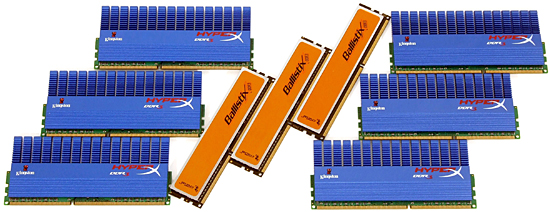Do You Really Need More Than 6 GB Of RAM?
Get Tom's Hardware's best news and in-depth reviews, straight to your inbox.
You are now subscribed
Your newsletter sign-up was successful
Is “Too Much” Really Just Enough?
The notion that bigger is better has taken a beating lately in all aspects of society.
Once the pride of the so-called upper middle class in the United States, McMansions and SUVs have now become symbols of excess and waste--at least the reminders of an era past. Green movement proponents should certainly be happy that so many “earth abusers” are beginning to see the light, but what about performance-computing fanatics? With memory prices near record lows, is there any good reason not to fill every slot with low-cost 2 GB DIMMs?
Environmentalists could point out that IC and PCB production turns a large quantity of natural resources into post-production waste, while most of the end-product is not recyclable and the additional components add to the system’s energy consumption. Power users could easily counter energy concerns by pointing out that a better-performing computer allows them to get their work done in less time. But neither argument is sufficient to answer the question we’ve asked so many times before: How much RAM do you really need?
Our 2004 article pointed out weaknesses in the once-popular single-gigabyte configurations. But 512 MB and smaller modules are now a distant memory. It wasnt long after that 2 GB became the performance standard, and by 2007, 4 GB kits could be found in all but the lowest-cost systems. Is it time to take the next step, to 8 GB or more? More importantly, were 4 GB modules ever really needed for games and everyday applications? And with the 32-bit addressing limit of 4 GB making only 3 GB available to many users, should everyone switch to a 64-bit operating system simply to support higher capacities?
Get Tom's Hardware's best news and in-depth reviews, straight to your inbox.
-
EQPlayer I run 8GB in my rig because... having open memory slots doesn't jive well with my OCD. Haha. /facepalmReply -
Try opening a PSD file from a 21-Megapixel camera with 3 or more layers in Photoshop and see the difference.Reply
-
Great info for the Vista crowd. What about DDR2 and XP? Betcha there are more of us than youse guys.Reply
-
whitewhale1 can someone help me with what apps will utilise more ram?Reply
im currently researching building a workstation for photoshop and some 3d modelling to be imported and rendered in CS4
any help much appreciated im no hardware guru :) -
Crashman ReplyGreat info for the Vista crowd. What about DDR2 and XP? Betcha there are more of us than youse guys.
It's generally accepted that XP uses less RAM than Vista, so you should be fine with 4GB (which, with 32-bit XP, will yield around 3GB of usefull address space). -
shades_aus @Thomas SoderstromReply
What the heck is that image on the front with all the memory modules!
Can you supply a link with a bigger pic??? That's just insane! -
curiousgeorgieo Hey guys I was wondering: What if you had a 9g game loaded completely on a ramdrive (64bit+software) then kept the remaining 3 for regular ram?Reply -
Crashman shades_aus@Thomas Soderstrom What the heck is that image on the front with all the memory modules!Can you supply a link with a bigger pic??? That's just insane!Reply
It looks like a memory testing machine or burn-in rack to me...I'm not sure where the site found it.
curiousgeorgieoHey guys I was wondering: What if you had a 9g game loaded completely on a ramdrive (64bit+software) then kept the remaining 3 for regular ram?
That's a great idea! Because it takes sooo long to copy an entire game from the hard drive to "anything" (even RAM), most users won't even try it. But you would get super-fast map loads! -
Try using several VMs in parallel and you'll be happy to have more than 3 GB. I'm using one VM for work (image of my work notebook with VPN etc.) and one for online banking (mainly because my old smartcard isn't supported in 64bit OS, little bit of a catch22).Reply

